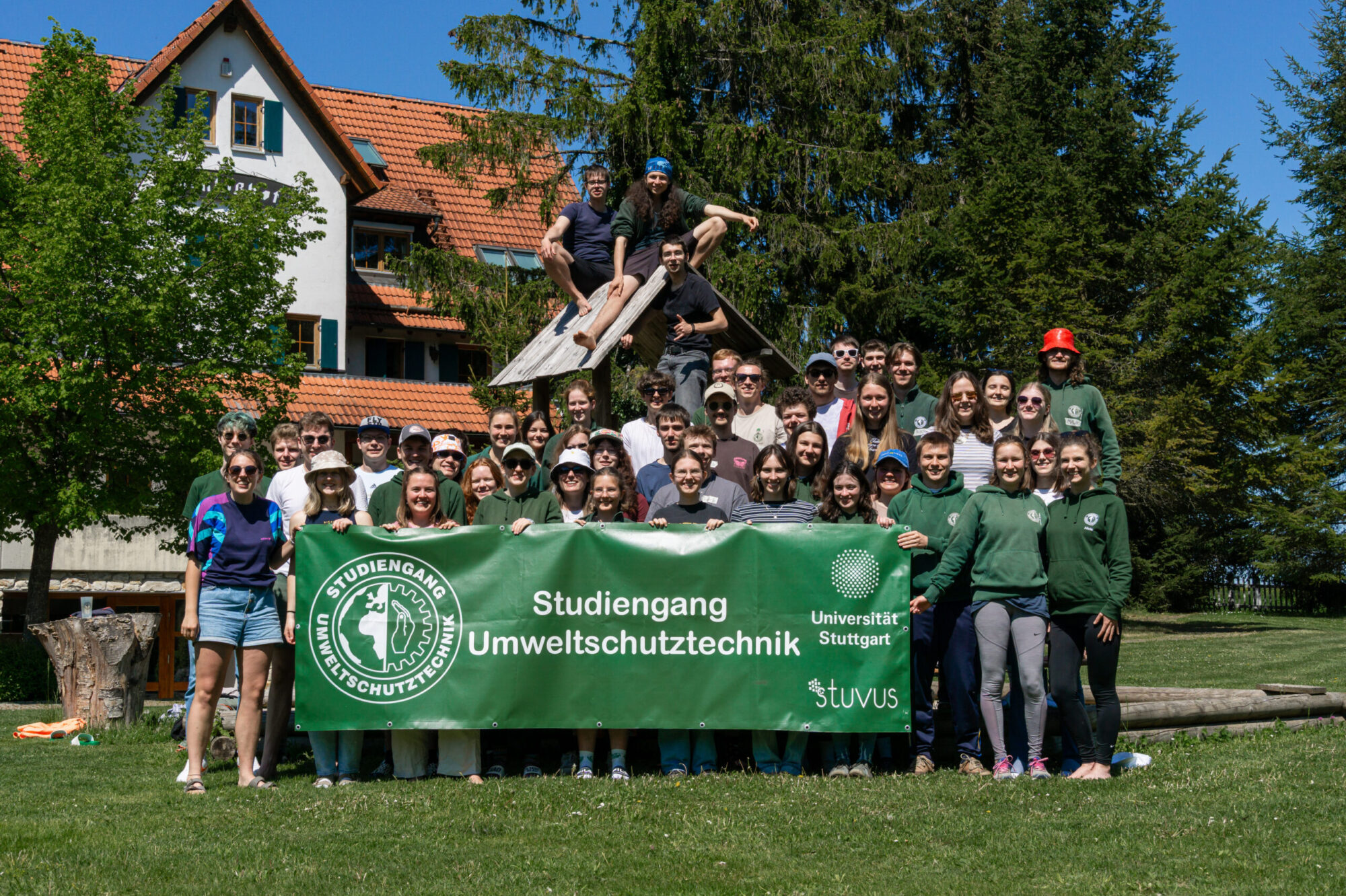Are you already enrolled and about to start? Then all the important information for you is on our first-year students page.
Interested?
What is Environmental Engineering?
The task of Environmental Engineering is to be able to use nature in the long term without permanently damaging or depleting it, while preserving a high quality of life.
Environmental Engineering as a study program at the University of Stuttgart is the teaching of techniques in the service of this environmental protection, their natural law, economic, political and legal foundations and their effects.
The Environmental Engineering study program is characterised above all by the fact that you are taught a broad basic knowledge of both technical and natural science subjects. This also requires that the courses offered include almost all faculties.
It should be clear to you that it is an engineering course:
- The study program is demanding and can therefore only be mastered with great motivation.
- A scientific approach to problems is difficult to reconcile with a purely ideological way of thinking.
Nevertheless, we see ourselves as do-gooders and a certain environmentally conscious attitude is certainly not a mistake.
Bachelor application
So you’ve decided to try your luck with us? Great! Then let’s go to the application!
All necessary information can be found on the official application page of the university. Please read the instructions carefully before starting the online application. Further information can be found on the official page of our study program.
Entrance examination
Since WS 08/09, an entrance examination has been held: the exact calculation rules can be found on this page.
This entrance examination is not an individual (written/oral) examination, but you submit the relevant documents and these are then assessed.
You need 55 points, with the additional documents you can get a maximum of 30 points, which means that if you get less than 25 points with your grades, you will unfortunately not be admitted. The documents are also checked by students and they mean you no harm! So make a little effort with your documents and your chances of getting in are not bad.
Components of the entrance examination are
- Subjects specific to the study program: Mathematics, German, English and the highest graded natural science subject (biology, chemistry, physics).
- Vocational training specific to the study program/completed study program/practical activity
- Subject-specific additional qualification/extracurricular achievements
- A letter of motivation (SHOULD ABSOLUTELY be submitted with the application – additional points will be awarded if the grades are not quite sufficient).
Good luck and hopefully we will meet in the first week of lectures. :)
Master application
The Master’s program builds on the content of the Bachelor’s program and thus deepens existing knowledge. At the University of Stuttgart, the Master’s programme can be started in either the winter or summer semester.
Information on how to apply for the Master’s programme in Environmental Protection Technology can be found on the official study program website.
When applying, it is imperative that you submit your complete reports and evidence of academic achievement earned in the entire Bachelor’s programme (basic and main studies!), so that you are not rejected due to missing information.
For some external applicants, so-called supplementary modules are imposed if there are “gaps” in the material due to the previous Bachelor’s degree.
These modules must be “worked through” by the time the Master’s thesis is registered in order to make up for the missing knowledge that is necessary for the Master’s program.
Whether or not, and if so, which, modules are imposed depends on the previous Bachelor’s degree programme: If, for example, a lot of natural science was studied, but only a few engineering science, technical mechanics, technical thermodynamics, etc. could be possible requirements. If, on the other hand, engineering sciences were predominantly studied in the bachelor’s degree programme, chemistry, biology or measurement technology are possible requirement modules.
After admission, Master’s students can choose from six fields of study, which offer a wide range of lectures.
Study rooms
The learning phase is coming up and you are looking for a quiet place to study? The website of stuvus stuvus – Lernräume offers a good overview. There are other places available for students of Faculty 2, which are unfortunately not listed on the stuvus website. These include
- the Eselroom: Study room in Pfaffenwaldring 7, 3rd floor, room 3.154. Access with ECUS. Working in groups is possible. Acoustic panels and a relatively quiet working atmosphere ensure that you are not distracted by too many people.
- the Skylounge: Study room in Pfaffenwaldring 7, 4th floor. Access with ECUS. Relatively small study room with a magnificent view.
- the study rooms opposite of SimTech and VING. Access with ECUS.
- CIP pools in Pfaffenwaldring 7, access via ECUS only with prior approval. Information on the application can be found on the faculty website.
Recommendations for
- hot summer days: The CIP pool in the NWZ (Physics building, PWR 57) is air-conditioned
- Computer access: The CIP pool in the NWZ offers access with the st-ID
- the weak bladder: the stuvus study room in the Haus der Studierenden (PWR 5c, ground floor) is not only at ground level, but also has a toilet right next to it
- late learning units: PWR 7 study rooms, Universum study room, CIP pool NWZ, HdS study room
- early learning units: The CampusGuest and the CIP pool in the NWZ are open before the library opens its doors
- learning at the weekend: Access to the study rooms in HdS and PWR 7 is also possible at weekends and on public holidays via ECUS. Access is only partially restricted during university celebrations
- far away: At the ISWA (Bandtäle 2), not only the cafeteria can be used for studying, but also the seminar room on the ground floor directly to the right of the entrance can be used for studying outside of the occupancy times.
